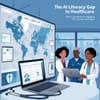The rapid development of generative artificial intelligence in healthcare has created a significant challenge for healthcare educators and professionals. The widespread use of generative AI threatens assessment integrity, potentially inhibiting critical thinking, problem-solving skills, and knowledge acquisition. Moreover, inadequate AI literacy can compromise patient safety and professional integrity, eroding future healthcare workforce competence.
Many universities and healthcare educators have failed to keep up with the rapid development of generative AI, leaving a gap in AI literacy among healthcare professionals. This gap can have serious consequences, including compromised patient care and decreased professional effectiveness.
However, generative AI also presents opportunities for enhancing learning and patient care. When used ethically, AI can assist healthcare professionals in various tasks, such as data analysis, patient engagement, and clinical decision-making. AI can also help create tailored treatment plans based on individual genetic data and lifestyle.
To bridge the AI literacy gap, healthcare workers need technical training and assistance to effectively utilize AI tools and ensure accurate delivery of care. Developing user-friendly AI tools can facilitate adoption and improve patient care. Moreover, AI tools should prioritize data privacy, addressing concerns about patient confidentiality.
By acknowledging the challenges and opportunities presented by generative AI, healthcare educators and professionals can work together to ensure that AI is used responsibly and effectively in healthcare. This requires a concerted effort to develop AI literacy among healthcare professionals and to harness the potential of AI to improve patient care and outcomes.


